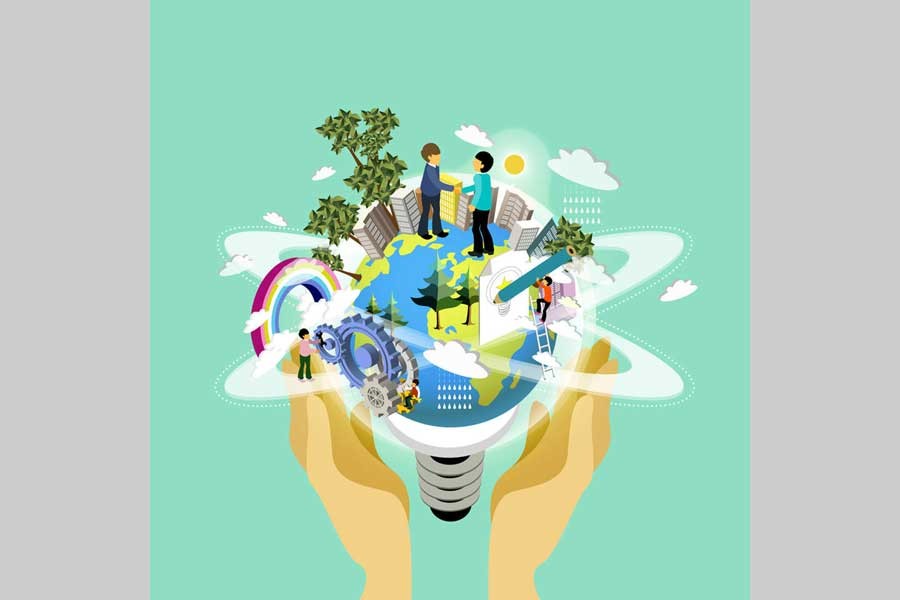It the last month, Sustainable Development Report, 2021 was published. Since the adoption of the agenda in 2015, every year an annual report is made to provide latest updates. This year the report provides a gloomy face of our overall development. According to the report, for the first time since its launch back in 2015, the global index score is on downfall. And it is due to the wide ranges of impact of Covid-19 pandemic on the SDGs as pandemic is wreaking havoc on social, economic and environmental aspects.
According to the report, increased poverty rate and unemployment of 2020 is responsible for the downfall. Moreover, growing environmental concerns, racial and economic inequalities are also important factors behind this gloomy outcome.
This year, Finland is ranked first among 193 countries with a score of 85.9. Other OECD (Organisation for Economic Co-operation and Development) countries have also found their place in top 20s as usual. But these high income countries also have drawbacks as all of them have scored 'Red' at least in one criterion. For instance, most of the OECD countries have scored 'Red' in climate action. However, USA stood at 32d and China was ranked 57 in the report.
OVERALL INDEX SCORE ON DOWNFALL THIS YEAR (SDGINDEX): Region wise data shows that, East and South Asia as a region has progressed most both since 2010 and since the adoption of agenda in 2015. East and South Asia as a region is highly diverse in demography, terrain, legacy and economy and is currently going through various development phases. But the region still managed to progress the most. According to the report, amid pandemic, Low Income Developing Countries (LIDC) lacked severely from financial shortages in emergency management which is also an important factor to address.
However, as individual country, three countries have the most progress rate and they are Bangladesh, Afghanistan and Cote D'Ivoire. Their performance and progress rates are highest since the adoption of agenda in 2015. Bangladesh has the rate more than 4.0 per cent; Afghanistan and Cote D'Ivoire have the rates close to 4 per cent. Interestingly, amid the pandemic, they all scored 'Green' in Environment.
Apart from this criterion, Bangladesh also scored 'Green' in consumption and production and scored 'on track' in poverty reduction and quality education amidst the pandemic. On the other hand, the report also identified three countries that declined most and they are Brazil, Venezuela and Tuvalu. Among them, Venezuela has the worst percentage rate close to -5 per cent. It is also expected situation as Venezuela is going through their worst economic crisis for quite sometimes.
According to the report, due to pandemic, poverty rate and unemployment rate increased in 2020. It will affect overall agenda of reducing global poverty to 6 per cent by 2030. Hence, as now the situation is harsh, it will be hard to reach the projection by that time. Moreover, prolonged global health emergency due to pandemic will also hinder the regular process of achieving the goals within projected timeline.
The report also acknowledged that, before pandemic, the situation was optimistic globally with East and South Asia showing significant progress on the agenda. But due to pandemic, the situation is changing towards decline that may result in delay in fulfilling the agenda on projected time. The report also addressed the use of technology amidst pandemic. According to the report, the world urgently needs to improve digital infrastructure as digital divide is visible during the pandemic and people are facing insufficient digital facilities. Moreover, in the context of pandemic, the report also addressed the growing 'vaccine nationalism' and urged to take multilateral step to overcome.
However, the report also highlighted the need for collective action on environmental degradation. In economic aspect, it also advised that, SDGs and six SDG transformations (Education and Gender, Health and Wellbeing, Energy, Food, Cities and communities & sustainable Digital Revolution) should be prioritised for ensuring inclusive and resilient recovery from Covid-19.
In this context, the report also highlighted that Bangladesh, Afghanistan and Cote D'Ivoire have implemented SDGs on national level and have already found advantage in fighting against the pandemic. Furthermore, the report also urged for ensuring urgent funds for LIDC groups for ensuring better emergency response during the pandemic. Lastly, the report urged for further investment in statistical capacity worldwide to overcome data gaps and time lags that hinders in making of the report every year.
This year is a historic event for Sustainable Development Report as for the first time the index score has experienced a slide since the beginning in 2015. The report also signals possible delay in fulfilling the agenda in future too. However, this is still a temporary situation and if we can overcome the pandemic, the situation may improve again. But in order to achieve that and avoid the delay of reaching projection by 2030, countries must come forward and act in multilateral forum in every aspect of SDG goals.
M M Rahman is an analyst on political economy
--


